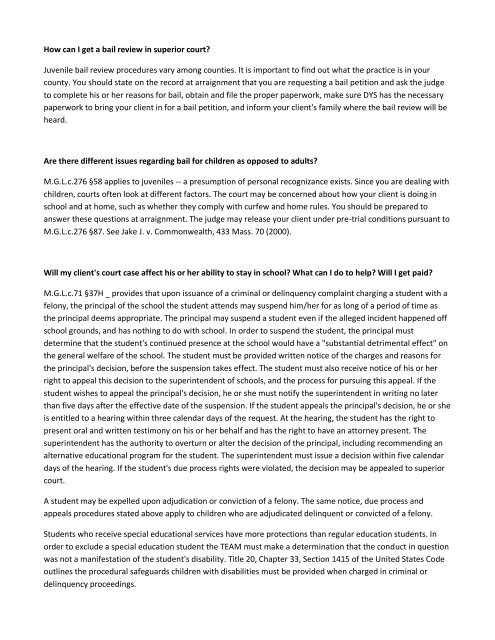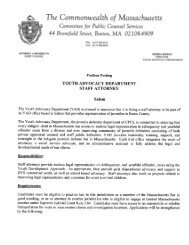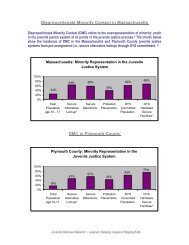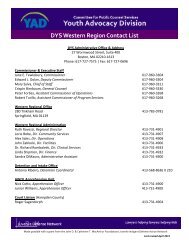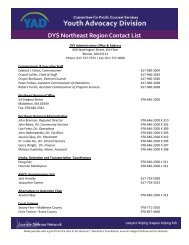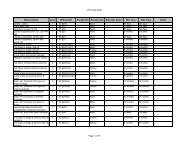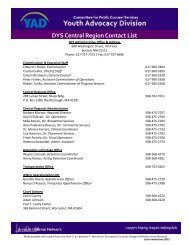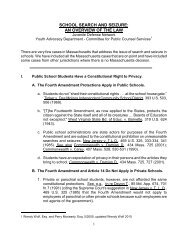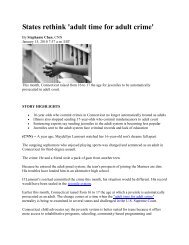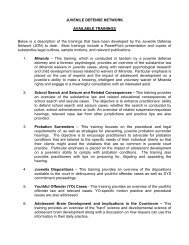pdf version - the Youth Advocacy Division
pdf version - the Youth Advocacy Division
pdf version - the Youth Advocacy Division
Create successful ePaper yourself
Turn your PDF publications into a flip-book with our unique Google optimized e-Paper software.
How can I get a bail review in superior court<br />
Juvenile bail review procedures vary among counties. It is important to find out what <strong>the</strong> practice is in your<br />
county. You should state on <strong>the</strong> record at arraignment that you are requesting a bail petition and ask <strong>the</strong> judge<br />
to complete his or her reasons for bail, obtain and file <strong>the</strong> proper paperwork, make sure DYS has <strong>the</strong> necessary<br />
paperwork to bring your client in for a bail petition, and inform your client's family where <strong>the</strong> bail review will be<br />
heard.<br />
Are <strong>the</strong>re different issues regarding bail for children as opposed to adults<br />
M.G.L.c.276 §58 applies to juveniles -- a presumption of personal recognizance exists. Since you are dealing with<br />
children, courts often look at different factors. The court may be concerned about how your client is doing in<br />
school and at home, such as whe<strong>the</strong>r <strong>the</strong>y comply with curfew and home rules. You should be prepared to<br />
answer <strong>the</strong>se questions at arraignment. The judge may release your client under pre-trial conditions pursuant to<br />
M.G.L.c.276 §87. See Jake J. v. Commonwealth, 433 Mass. 70 (2000).<br />
Will my client's court case affect his or her ability to stay in school What can I do to help Will I get paid<br />
M.G.L.c.71 §37H _ provides that upon issuance of a criminal or delinquency complaint charging a student with a<br />
felony, <strong>the</strong> principal of <strong>the</strong> school <strong>the</strong> student attends may suspend him/her for as long of a period of time as<br />
<strong>the</strong> principal deems appropriate. The principal may suspend a student even if <strong>the</strong> alleged incident happened off<br />
school grounds, and has nothing to do with school. In order to suspend <strong>the</strong> student, <strong>the</strong> principal must<br />
determine that <strong>the</strong> student's continued presence at <strong>the</strong> school would have a "substantial detrimental effect" on<br />
<strong>the</strong> general welfare of <strong>the</strong> school. The student must be provided written notice of <strong>the</strong> charges and reasons for<br />
<strong>the</strong> principal's decision, before <strong>the</strong> suspension takes effect. The student must also receive notice of his or her<br />
right to appeal this decision to <strong>the</strong> superintendent of schools, and <strong>the</strong> process for pursuing this appeal. If <strong>the</strong><br />
student wishes to appeal <strong>the</strong> principal's decision, he or she must notify <strong>the</strong> superintendent in writing no later<br />
than five days after <strong>the</strong> effective date of <strong>the</strong> suspension. If <strong>the</strong> student appeals <strong>the</strong> principal's decision, he or she<br />
is entitled to a hearing within three calendar days of <strong>the</strong> request. At <strong>the</strong> hearing, <strong>the</strong> student has <strong>the</strong> right to<br />
present oral and written testimony on his or her behalf and has <strong>the</strong> right to have an attorney present. The<br />
superintendent has <strong>the</strong> authority to overturn or alter <strong>the</strong> decision of <strong>the</strong> principal, including recommending an<br />
alternative educational program for <strong>the</strong> student. The superintendent must issue a decision within five calendar<br />
days of <strong>the</strong> hearing. If <strong>the</strong> student's due process rights were violated, <strong>the</strong> decision may be appealed to superior<br />
court.<br />
A student may be expelled upon adjudication or conviction of a felony. The same notice, due process and<br />
appeals procedures stated above apply to children who are adjudicated delinquent or convicted of a felony.<br />
Students who receive special educational services have more protections than regular education students. In<br />
order to exclude a special education student <strong>the</strong> TEAM must make a determination that <strong>the</strong> conduct in question<br />
was not a manifestation of <strong>the</strong> student's disability. Title 20, Chapter 33, Section 1415 of <strong>the</strong> United States Code<br />
outlines <strong>the</strong> procedural safeguards children with disabilities must be provided when charged in criminal or<br />
delinquency proceedings.


